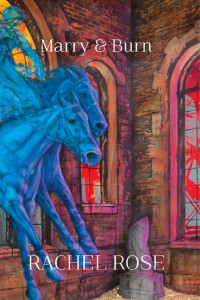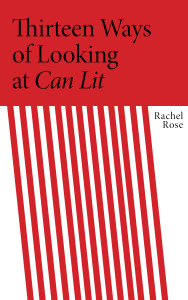
With only a little over two weeks left to submit to PRISM international’s 2016 Creative Non-Fiction Contest, we touched base with contest judge Rachel Rose to hear more about what she’s looking for in a winning submission as well as her first book-length work of non-fiction.
Rachel Rose has won poetry, fiction, and non-fiction awards, including a 2016 Pushcart Prize. Recently a fellow at The University of Iowa’s International Writing Program, she is the Poet Laureate of Vancouver. A chapbook, Thirteen Ways of Looking at CanLit, (BookThug) and a poetry collection, Marry & Burn (Harbour) were published in 2015. Her non-fiction book, Gone to the Dogs: Riding Shotgun with K9 Cops, is forthcoming from St. Martin’s Press/Thomas Dunne Books.

Interviewed by Curtis LeBlanc.
CL: Can you tell prospective contest entrants what it is you’re looking for in a winning piece as the judge of this year’s Creative Non-Fiction Contest?
RR: I’m looking for strong, surprising, provocative pieces of non-fiction. I don’t care whether they are narrative-driven or character-driven, carefully braided and crafted, or rough, edgy and startling journeys. Take me to a place I didn’t know I wanted to go. Teach me a truth I would rather deny. Educate me. Enrage me. Expand my vision. You know.
Your first book-length work of non-fiction is due out from St. Martin’s Press/Thomas Dunne Books in 2017. Can you tell us a little bit about the book?
I am asked that question a lot, and behind that question is this question: how the hell did a poet like you end up riding shotgun with some of the most battle-scarred cops in the business and some of the smartest, most dangerous dogs around?
Well, I have long been fascinated by police dogs. But I did nothing about it. What stopped me was fear. What right did I have to call up some random police detachment and ask if I could hang out with their K9 teams?
But then I realized that if I wanted to ever read the book about police dogs and the men and women who trained them, I would have to write it first. Despite my fear and their initial skepticism, some fine, brave men and women opened up to me. It took everything I had to keep up physically and emotionally, tracking with the police handlers and their dogs. It took every ounce of courage I possessed to sit beside them as we raced, sirens screaming, to whatever awaited us. During training exercises, I had to stand my ground and allow myself to be attacked by a police dog who had suddenly transformed into a snarling, snapping nightmare. What kept me going was my great admiration for the dogs themselves, and my fascination with the bond between the dogs and their humans.
But even though this project is a great leap, I don’t see it as out of character. The best part of being a writer, for me (aside from making things out of words) is entering other worlds, connecting to those who are nothing like you and yet with whom you have commonalities. It doesn’t matter whether these connections are imagined or actual; they are profound. I can’t get over the immense privilege of saying that I am a writer, and that I am interested, and having people share their lives and their intimate selves with me. What an incredible gift.
I understand you were recently in Europe doing some additional research for the Gone to the Dogs project. How was that experience and what did the research entail?
I spent time in London and then in Paris. Without giving too much away, let me say that I found it so important to connect with police departments who are able to operate quite differently than in the US and Canada, because the vast majority of their citizens are unarmed. The dogs are trained differently—in Paris, police dogs are usually muzzled. In London, many police officers use both working Shepherds and English Spaniels. The relationship between police and citizens also shifts when both are unarmed. At the same time, police dog units in both London and Paris are dealing with terrorism, and I interviewed first responders to the terrorist attacks in Paris, whose lives were forever changed by the horrific work they were called upon to do.
 You were recently a fellow at the University of Iowa’s International Writing Program. In what ways did your time there enrich your life and your writing?
You were recently a fellow at the University of Iowa’s International Writing Program. In what ways did your time there enrich your life and your writing?
IWP was transformative on so many levels. For almost three months, I was with a group consisting of writers from 34 different countries; I lived in a small city where some of the best U.S. and international writers came to read every week at Prairie Lights bookstore. I had the gift of uninterrupted time to work with translators, to collaborate in a deep way with other writers and artists, to generate new work. It was a very happy time.
I think the biggest shift for me was a sudden leap in taking risks again in my own work. There is something wonderfully demystifying about seeing the Great Writers up close, and observing how they create. Or maybe it was the courage of some of the international writers, who wrote despite death threats and great personal hardship—I thought, What do I possibly have to fear? Whatever it was, I felt freer than I have since I first began to write—free to play with fiction, to work on translation, to stay up writing until three in the morning, and to eat nothing but popcorn and apples for dinner if I felt like it.
How do you balance your writing life with your role as Vancouver’s Poet Laureate?
Ha! I have been on panels about balancing motherhood and writing, but the truth is, there’s no such thing as balance. I do well with a full life. Even though I have escape fantasies about a quiet cottage in a coastal town with no internet, a weekend taking care of my friends’ chickens usually cures me. I love being Poet Laureate, love the work and the challenge of collaborating with other artists and activists in our city. The skills are very different. It’s fascinating to see who runs our city—I never would have had the opportunity to meet the Mayor, members of City Council, or any of the incredible leaders in art, theatre, music, and culinary arts that I’ve gotten to meet without this opportunity. Grateful doesn’t begin to cover it.
There you have it, writers and readers. Thank you so much to Rachel Rose for her generous answers, and to all of you for your interest in PRISM international’s Non-Fiction Contest.
You can hit the button below to submit online before July 15th! Happy writing!
